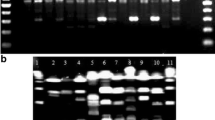Abstract
In the evaluation of treatment failure in group A streptococcal pharyngitis, it is essential to distinguish persistence or relapse with homologous streptococcal strains from the acquisition of new, unrelated strains. Randomly amplified polymorphic DNA analysis and restriction fragment length polymorphism analysis of total DNA were used as epidemiological tools to compare 122 pre- and post-treatmentStreptococcus pyogenes isolates obtained from 61 patients. The results obtained by molecular typing showed that bacteriological failures were due to the original strains in 43 cases (70%) and to new strains in 18 cases (30%). In the present study, restriction fragment length polymorphism analysis of total DNA appeared to be more discriminative than randomly amplified polymorphic DNA analysis. Thus, molecular analysis of DNA is an effective way to distinguish recurrence from persistence or relapse and will be useful in assessing the efficacy of new antibiotic treatments.
Similar content being viewed by others
References
Chow AW, Hall CB, Klein JO, Kammer RB, Meyer RD, Remington JS: Evaluation of new anti-infective drugs for the treatment of respiratory tract infections. Clinical Infectious Diseases 1992, Supplement 1: 62–88.
Gastanaduy AS, Kaplan EL, Huwe BB, McKay C, Wannamaker LW: Failure of penicillin to eradicate group A streptococci during an outbreak of pharyngitis. Lancet 1980, ii: 498–502.
Feldman S, Bisno AL, Lott L, Dodge R, Jackson RE: Efficacy of benzathine penicillin G in group A streptococcal pharyngitis: reevaluation. Journal of Pediatrics 1987, 110: 783–787.
Bergman A, Werner R: Failure of children to receive penicillin by mouth. New England Journal of Medicine 1953, 268: 1334.
Brooks I: The role of Β-Iactamase producing bacteria in the persistence of streptococcal tonsillar infection. Reviews of Infectious Diseases 1984, 6: 601–607.
Kim LS, Kaplan EL: Association of penicillin tolerance with failure to eradicate group A streptococci from patients with pharyngitis, Journal of Pediatrics 1985, 107: 681–684.
Dillon HC: Streptococcal pharyngitis in the 1980s. Pediatric Infectious Disease Journal 1987, 6: 123–130.
Bingen E, Barc M-C, Brahimi N, Vilmer E, Beaufils F: Randomly amplified polymorphic DNA analysis provides rapid differentiation of methicillin-resistant coagulase negativeStaphylococcus bacteremia isolates in a pediatric hospital. Journal of Clinical Microbiology 1995, 33: 1657–1659.
Bingen E, Denamur E, Lambert-Zechovsky N, Boissinot C, Brahimi N, Aujard Y, Blot P, Elion J: Mother-to-infant vertical transmission and cross-colonization ofStreptococcus pyogenes confirmed by DNA restriction fragment length polymorphism analysis. Journal of Infectious Diseases 1992, 165: 147–150.
Kersulyte D, Struelens MJ, Delplano A, Berg DE: Comparison of arbitrarily primed PCR and macrorestriction (pulsed-field gel electrophoresis) typing ofPseudomonas aeruginosa strains from cystic fibrosis patients. Journal of Clinical Microbiology 1995, 33: 2216–2219.
Gerber MA, Randolph MR, De Meo K, Feder HM, Kaplan EL: Failure of once-daily penicillin V therapy for streptococcal pharyngitis. American Journal of Diseases of Childhood 1989, 143: 153–157.
McCracken GH: Diagnosis and management of children with streptococcal pharyngitis. Pediatric Infectious Disease Journal 1986, 5: 754–759.
Skjold S, Wannamaker LW: Method for phage typing group A type 49streptococci. Journal of Clinical Microbiology 1976, 4: 232–238.
Tagg JR, Bannister LV: “Fingerprinting” Β-haemolytic streptococci by their production of and sensitivity to bacteriocin-like inhibitors. Journal of Medical Microbiology 1979, 12: 397–411.
Magee JT, Hindmarch JM, Burnett IA, Pease A: Epidemiological typing ofStreptococcus pyogenes by pyrolysis mass spectrometry. Journal of Medical Microbiology 1989, 30: 273–278.
Musser JM, Hauser AR, Kim MH, Schlievert PM, Nelson K, Selander RK:Streptococcus pyogenes causing toxic-shock-like syndrome and other invasive diseases: clonal diversity and pyrogenic exotoxin expression. Proceedings of the National Academy Sciences of the USA 1991, 88: 2668–2672.
Lancefield RC: Serological differentiation of human and other groups of hemolytic streptococci. Journal of Experimental Medicine 1933, 57: 571–595.
SeppÄlÄ H, Vuopio-Varkila J, Osterblad M, Jahkola M, Rummukainen M, Holm SE, Huovinen P: Evaluation of methods for epidemiologic typing of group A streptococci. Journal of Infectious Diseases 1994, 169: 519–525.
Cleary PP, Kaplan EL, Livdahl C, Skjold S: DNA fingerprints ofStreptococcus pyogenes are M type specific. Journal of Infectious Diseases 1988, 158: 1317–1323.
Bingen E, Denamur E, Lambert-Zechovsky N, Brahimi N, El Lakany M, Elion J: DNA restriction fragment length polymorphism differentiates recurrence from relapse in treatment failures ofStreptococcus pyogenes pharyngitis. Journal of Medical Microbiology 1992, 34: 162–164.
Grimont F, Grimont PAD: Ribosomal ribonucleic acid gene restriction patterns as potential taxonomic tools. Annales de l'Institut Pasteur/Microbiologie 1986, 137B: 165–175.
Stull TL, LiPuma JJ, Edlind TD: A broad-spectrum probe for molecular epidemiology of bacteria ribosomal RNA. Journal of Infectious Diseases 1988, 157: 280–286.
Single LA, Martin DR: Clonal differences within M-types of the group AStreptococcus revealed by pulsed-field gel electrophoresis. FEMS Microbiology Letters 1992, 91: 85–89.
Welsh J, McClelland M: Fingerprinting genomes using PCR with arbitrary primers. Nucleic Acids Research 1990, 18: 7213–7218.
Williams JGK, Kubelik AR, Livak KJ, Rafalski JA, Tingey SV: DNA polymorphisms amplified by arbitrary primers are useful as genetic markers. Nucleic Acids Research 1990, 18: 6531–6535.
Bingen E, Boissinot C, Desjardins P, Cavé H, Brahimi N, Lamber-Zechovsky N, Denamur E, Blot P, Elion J: Arbitrarily primed polymerase chain reaction provides rapid differentiation ofProteus mirabilis isolates from a pediatric hospital. Journal of Clinical Microbiology 1993, 31: 1055–1059.
Cavé H, Bingen E, Elion J, Denamur E: Differentiation ofEscherichia coli strains using randomly amplified polymorphic DNA analysis. Research in Microbiology 1994, 145: 141–150.
Musser JM, Gray BM, Schlievert PM, Pichichero ME:Streptococcus pyogenes pharyngitis: characterization of strains by multilocus enzyme genotype, M and T protein serotype, and pyrogenic exotoxin gene probing. Journal of Clinical Microbiology 1992, 30: 600–603.
Author information
Authors and Affiliations
Rights and permissions
About this article
Cite this article
Fitoussi, F., Cohen, R., Brami, G. et al. Molecular DNA analysis for differentiation of persistence or relapse from recurrence in treatment failure ofStreptococcus pyogenes pharyngitis. Eur. J. Clin. Microbiol. Infect. Dis. 16, 233–237 (1997). https://doi.org/10.1007/BF01709587
Issue Date:
DOI: https://doi.org/10.1007/BF01709587




